There’s a hidden cove in Houpihu (後壁湖) close to Kenting (墾丁) that is accessible only by one of two ways. The first is by walking through a tunnel made out of weathered, interlocking tree branches from a small opening in the thickets along the main road. The second is by navigating a maze of rock formations from the main beach where all the tour buses are parked.
The sand in this cove is covered with small cracked bits of moss-green coral. Although the winds are usually howling from November to March, the turquoise water remains still and clear — so much so that you can see tiny black fish nipping at your feet as you wade in. Giant rocks jutting out from the seabed block the waves, creating ideal snorkeling conditions. Although winter is mild, you’ll need luck with trying to find a snorkel shop that’s open during this time of year.
There are several caves to explore where the crevices are big enough to fit a small person. The sheer space inside the caves, however, will make anyone who rents a tiny apartment in Taipei envious.
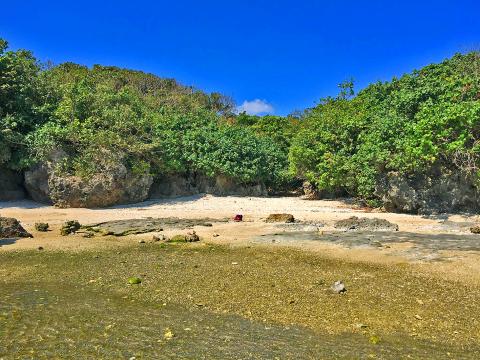
Photo: Dana Ter, Taipei Times
SECRET COVES
This was the Kenting I had been searching for — a quiet, relaxing spot on my own private beach where I could take a dip in the cool water and then dry off to scribble in my journal.
So it’s ironic how exhausting the trek to get here was — not physically speaking, but more in the sense of having to explain to puzzled tour guides and taxi drivers why I didn’t want to stay on the usual tourist route and reassuring them that as a licensed scuba diver, I was not going to drown in knee-deep water.
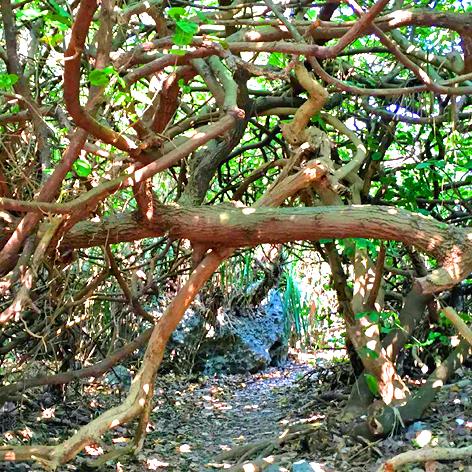
Photo: Dana Ter, Taipei Times
Only my driver Wu Yi-hsien (吳益賢), who introduced me to this cove, seemed to understand. Despite growing up during the last few years of Martial Law when most beaches were sealed off from public access, a few locals like Wu managed to sneak into secret spots such as this one.
“I lived in Taipei for a while but I wasn’t used to it because the moment you stepped out, you saw cars and people,” he says.
Wu, who has been frequenting this cove since he was a child, adds that “there used to be no one in Houpihu. Now, Chinese tourists are everywhere — they’re reading about it on Weibo,” he said, referring to China’s popular microblogging Web site.
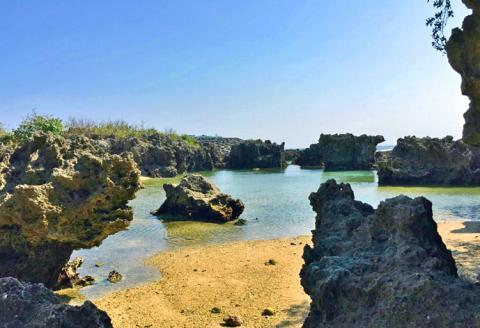
Photo: Dana Ter, Taipei Times
Fortunately the tour buses are only dropping people off at the main beach surrounding Houpihu. The cove, if you can find it, remains relatively untouched — at least for now.
CHOOSING THE RIGHT BEACH
A five-minute drive down the coastline of Houpihu is Maopitou (貓鼻頭), or “cat nose head.” This scenic lookout derives its name from the rock formation there which bears a striking resemblance to a crouching cat. Some of the most stunning views of Kenting’s pristine shorelines and rugged terrain can be seen from the lookout points situated atop Maopitou’s hanging cliffs.
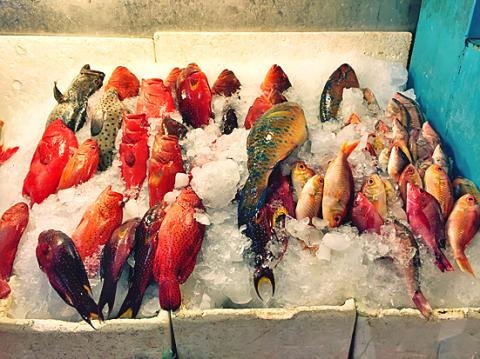
Photo: Dana Ter, Taipei Times
To the west of Houpihu and Maopitou is Baishawan (白沙灣), where Ang Lee (李安) filmed the beach scenes for his 2012 blockbuster Life of Pi. With no rocks or corals to navigate around or caves to scale, the white sand beach lined with palm trees is easy to access by car or motorcycle, making it an ideal spot for visitors.
“You have to visit Baishawan,” my other driver, Chiang En-wei (江恩瑋), says. “All of the Chinese tourists love to come here to watch the beautiful sunset.”
Before I could respond to his proposition, he left me in the center of a circus-like spectacle where colorful stalls on a large wooden deck sold coconuts and Jagermeister shots to tracksuit-clad Chinese tourists wielding umbrellas and selfie sticks.
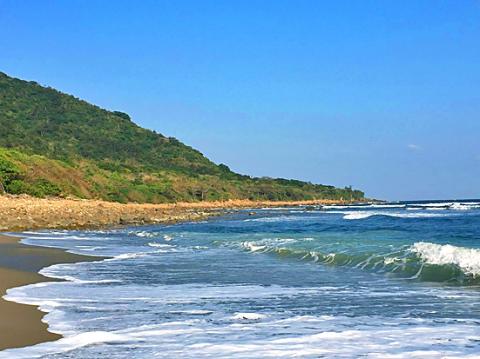
Photo: Dana Ter, Taipei Times
Trekking away from the wooden plank and onto the stretch of white sand, you’ll find more tranquility. Baishawan is a good tanning beach, even during winter. Since it’s a bay, the waves are gentle, making it pleasant to swim, although there are not many people in the water at this time of the year.
Baishawan has its perks, but if you’re the type who fancies a roaring landscape, check out Jialeshui (佳樂水) on the east side of Kenting National Park (see Taipei Times Jan. 28, p12). Known as a popular surf spot, the vast stretches of black sand are mostly deserted during late winter afternoons. The surf at this time of day is choppy but it makes for dramatic sceneries of the Pacific Ocean, especially with the vast mountain range surrounding it. There is also a river nearby where you can rent kayaks and row them below a suspension bridge.
While you can kick back with a Pina Colada and dance to reggae music with the setting sun in the background at Baishawan, Jialeshui offers a more contemplative landscape should you prefer to watch the sunset in solitude, unperturbed by tourists.
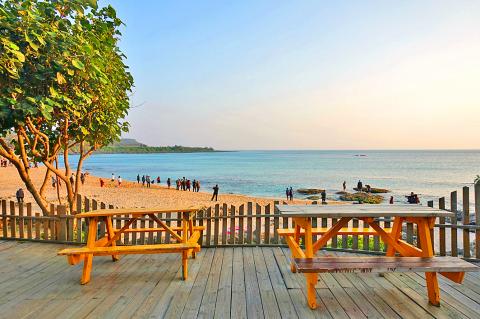
Photo: Dana Ter, Taipei Times
DEEP-FRIED OREO DELIGHTS
In terms of satisfying your palate, ask any long-time Kenting resident and they’ll say you can’t leave Kenting without sampling the seafood. Houpihu’s fish market is a must-try for sashimi lovers. Situated by the bay near a few scuba diving shops and docked boats, the fish market is buried in an unassuming white building.
The fresh fish and oysters are displayed enticingly in plain view for customers to see. A sashimi-oyster set at any stall can cost up to NT$300. Seating is sparse and cramped, so I suggest ordering takeaway and enjoying your meal outside by the bay instead, especially if it’s a fine day.
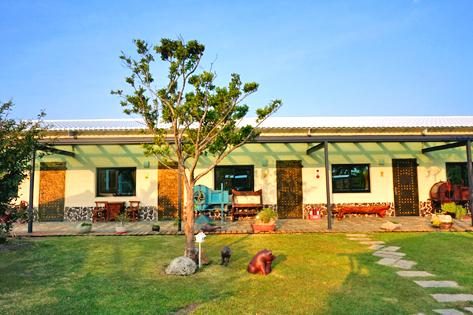
Photo: Dana Ter, Taipei Times
To the east of Houpihu, by Hsiaowan (小灣), is Kenting Night Market, which is famous for its delightful — albeit cavity-inducing — delicacies. The night market is easy to spot since it is situated in the middle of big name hotels like the Howard Beach Resort and Smokey Joe’s Hotel. Unlike Taipei’s cramped and narrow night markets, this one is wide with ample walking space, although locals tell me it’s shoulder-to-shoulder during summer.
Here, you’ll find no shortage of fried milk, deep-fried Oreos and sweetened veggies on skewers. The mobile pizzerias with fire-grill ovens serve up tasty Hawaiian pizzas as well. But for the more health-conscious who prefer to stay clear from street food, there is a decent selection of restaurants from Thai to American cuisine to choose from.
Regardless of your culinary preferences, you’ll definitely want to sample a few mixed drinks in one the many mobile street bars. If you get there early enough, preferably before 8pm, you’ll be able to watch the owners of these “bars” drive by, stop to park and pop up foldable tables that attach to their vehicles. They’ll bring out a few chairs from inside their vans and start setting up the bottles of vodka, rice wine and Taiwan Beer. The fluorescent lights make the mobile street bars look like betel nut shops but it’s really just booze here.
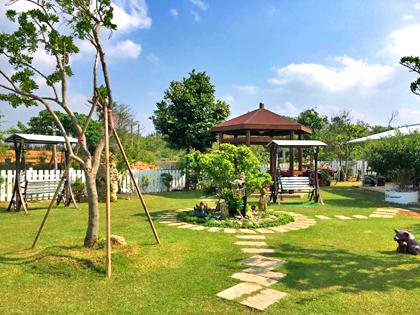
Photo: Dana Ter, Taipei Times
WINDING DOWN
After a long day of traversing secret coves and bulking up on deep-fried Oreos, there’s nothing better than returning to a comfy mountaintop villa, slipping on fuzzy slippers and stretching out on an L-shaped couch adorned with silk throw pillows.
Daguang Road (大光路), which is a five-minute drive uphill from Baishawan or Houpihu, or 10 minutes from Hengchun bus station (恆春轉運站), is home to Kenting’s newest boutique inns and villas. I stayed at the Lan Hai Inn (嵐海民宿), a homey single-story establishment with individual villas built in 2013. The decor in the room is a mixture of country inn and island lifestyle with earthy beige tones. Outside, there’s a well-kept garden filled with potted flowers and cute gnomes holding “welcome” signs.
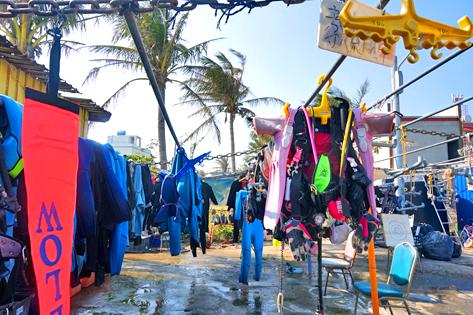
Photo: Dana Ter, Taipei Times
The inn is run by Wally Wu (吳宜霖), Wu Yi-hsien’s younger cousin. The younger Wu does the cooking — he’ll whip up a healthy salad with a hardboiled egg should you find yourself craving a late-night snack. Wu is also extremely helpful in arranging transportation and giving advice on which sites to see depending on what you’re in the mood to do that day.
Other resorts nearby include the slightly more upscale LuLu Villa (聽靜海) which has a swimming pool and ocean view rooms. There’s also the Happy Town Luxury Resort (快樂小鎮) with a blue-and-white Grecian theme and private hot tubs on balconies overlooking the ocean. These new hotels are all within walking distance of each other on Daguang Road and with all the available choices, it should be easy to find an appropriate one according to your taste and budget. Hotel rates are generally lower during winter, although expect a spike during the Chinese New Year holiday.
Despite being an increasingly popular tourist destination, Kenting has managed to retain a laid-back vibe. For vacationers, all that matters are beaches and bites, and Kenting certainly delivers. There are signs of over-tourism — notably busloads of mostly Chinese tourists encroaching into previously untapped territory — but during off-peak season it’s still possible to find secluded coves and uninhabited caves. And it’s these bits that make a trip memorable.
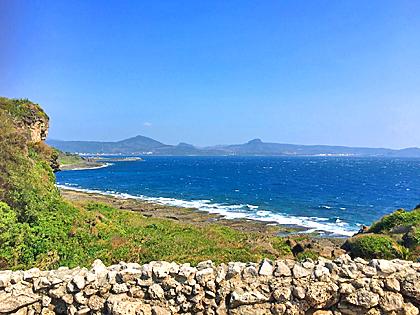
Photo: Dana Ter, Taipei Times
Getting there:
‧ Take the south-bound high speed rail (HSR) from Taipei Main Station to the last stop, Zuoying (左營). The ride takes approximately two hours. Another two hours on the Kenting express (bus no. 9189) from Zuoying HSR will get you to Hengchun (恆春) station
‧ The best way to travel around Kenting is by renting a car or motorcycle from Henghcun. Most hotels will help with arranging transportation but the rates are usually set rather than pay by the meter
Where to stay:
‧ Lan Hai Inn (嵐海民宿): www.facebook.com/blue38c
‧ LuLu Villa (聽靜海): www.facebook.com/luluvilla2014
‧ Happy Town Luxury Resort (快樂小鎮): www.facebook.com/happytown125
What to see:
‧ Coves and caves in Houpihu (後壁湖)
‧ Houpihu fish market
‧ Maopitou (貓鼻頭) scenic point
‧ Baishawan (白沙灣) where scenes from the Life of Pi were filmed
‧ Jialeshui (佳樂水) for surfing and kayaking
‧ Kenting Night Market near Hsiaowan (小灣)
What to bring:
‧ Bathing suit, warm clothes and a jacket to cut out the wind (during winter), water shoes for walking on rocky coves, flip-flops, towel, sunscreen

Exceptions to the rule are sometimes revealing. For a brief few years, there was an emerging ideological split between the Democratic Progressive Party (DPP) and Chinese Nationalist Party (KMT) that appeared to be pushing the DPP in a direction that would be considered more liberal, and the KMT more conservative. In the previous column, “The KMT-DPP’s bureaucrat-led developmental state” (Dec. 11, page 12), we examined how Taiwan’s democratic system developed, and how both the two main parties largely accepted a similar consensus on how Taiwan should be run domestically and did not split along the left-right lines more familiar in

As I finally slid into the warm embrace of the hot, clifftop pool, it was a serene moment of reflection. The sound of the river reflected off the cave walls, the white of our camping lights reflected off the dark, shimmering surface of the water, and I reflected on how fortunate I was to be here. After all, the beautiful walk through narrow canyons that had brought us here had been inaccessible for five years — and will be again soon. The day had started at the Huisun Forest Area (惠蓀林場), at the end of Nantou County Route 80, north and east

Specialty sandwiches loaded with the contents of an entire charcuterie board, overflowing with sauces, creams and all manner of creative add-ons, is perhaps one of the biggest global food trends of this year. From London to New York, lines form down the block for mortadella, burrata, pistachio and more stuffed between slices of fresh sourdough, rye or focaccia. To try the trend in Taipei, Munchies Mafia is for sure the spot — could this be the best sandwich in town? Carlos from Spain and Sergio from Mexico opened this spot just seven months ago. The two met working in the

This month the government ordered a one-year block of Xiaohongshu (小紅書) or Rednote, a Chinese social media platform with more than 3 million users in Taiwan. The government pointed to widespread fraud activity on the platform, along with cybersecurity failures. Officials said that they had reached out to the company and asked it to change. However, they received no response. The pro-China parties, the Chinese Nationalist Party (KMT) and Taiwan People’s Party (TPP), immediately swung into action, denouncing the ban as an attack on free speech. This “free speech” claim was then echoed by the People’s Republic of China (PRC),